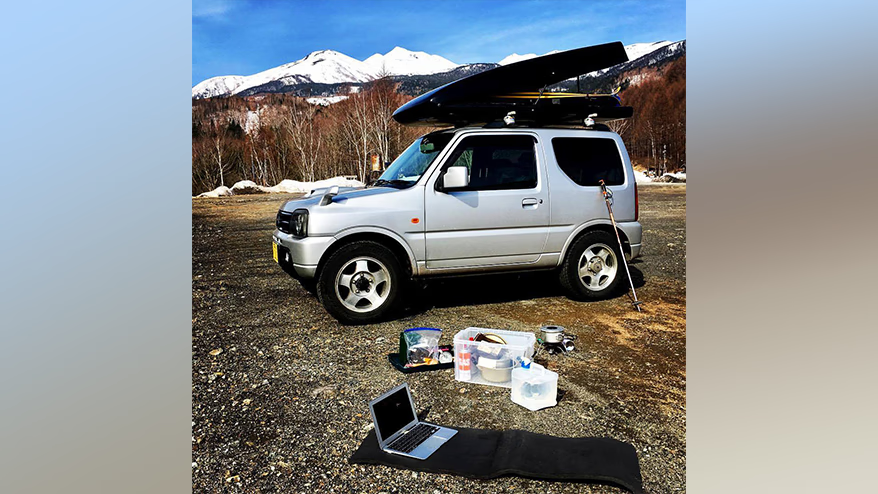WORK101担当の原澤が、気になる働き方をしているひとに話聞きに行く「WORK101インタビューあなたの「はたらく」教えて下さい」第二回目となる今回は、大阪を拠点に活動するgrafの創立メンバーであり現在はgm projectsで活動されている豊嶋秀樹さん。(表紙の写真は、豊嶋さんが旅の途中で、翌日スキーをする予定の山の麓に設置したテンポラリーオフィスの様子)
豊嶋さんとの出会いは、ものさすデザイン係、真鍋からの紹介でした。豊嶋さんの仕事や暮らしのとらえ方に、これからの「はたらく」環境を探求するためのヒントがあると思い、何か一緒に企画をできないかと相談をしたところ、『神山ハイキングクラブ』というプロジェクトを立ち上げることに。
そしてその記念すべき第一回神山ハイキングクラブの活動後、ものさすサイトを裏方でお手伝いしてくれているライターの杉本さんと一緒に、インタビューを行いました。
▼豊嶋さんプロフィール
豊嶋秀樹:大阪を拠点にクリエイティブ活動を展開するgrafの設立メンバーの一人で、2009年よりgm projectsのメンバーとして主にアートの分野でキュレーション、空間構成、ワークショップなど幅広いアプローチで活動する。
高尾山へ登ったことがきっかけで登山を始め、ウルトラライトハイキングのスタイルに傾倒。九州を中心としたハイカーコミュニティ「HAPPY HIKERS」の運営や、アウトドアブランド「山と道」のイベント企画なども行う。
若者は迷ってる?選択肢が増えてきた現代
2020年9月某日、神山町上角にあるWORK101の拠点でインタビューは行われました。到着してすぐ、豊嶋さんのこんな問いかけからインタビューが始まりました。
豊嶋:最近、若い世代の人たちから仕事や暮らし方について聞かれることが多いんですよね。来週も「オンラインでトークイベントするから出てくれませんか?」って。それも、30代の人だったけど、「なんでそんな話を聞きたいの?」「みんなそういうことが気になってるの?」って不思議に思ったんです。
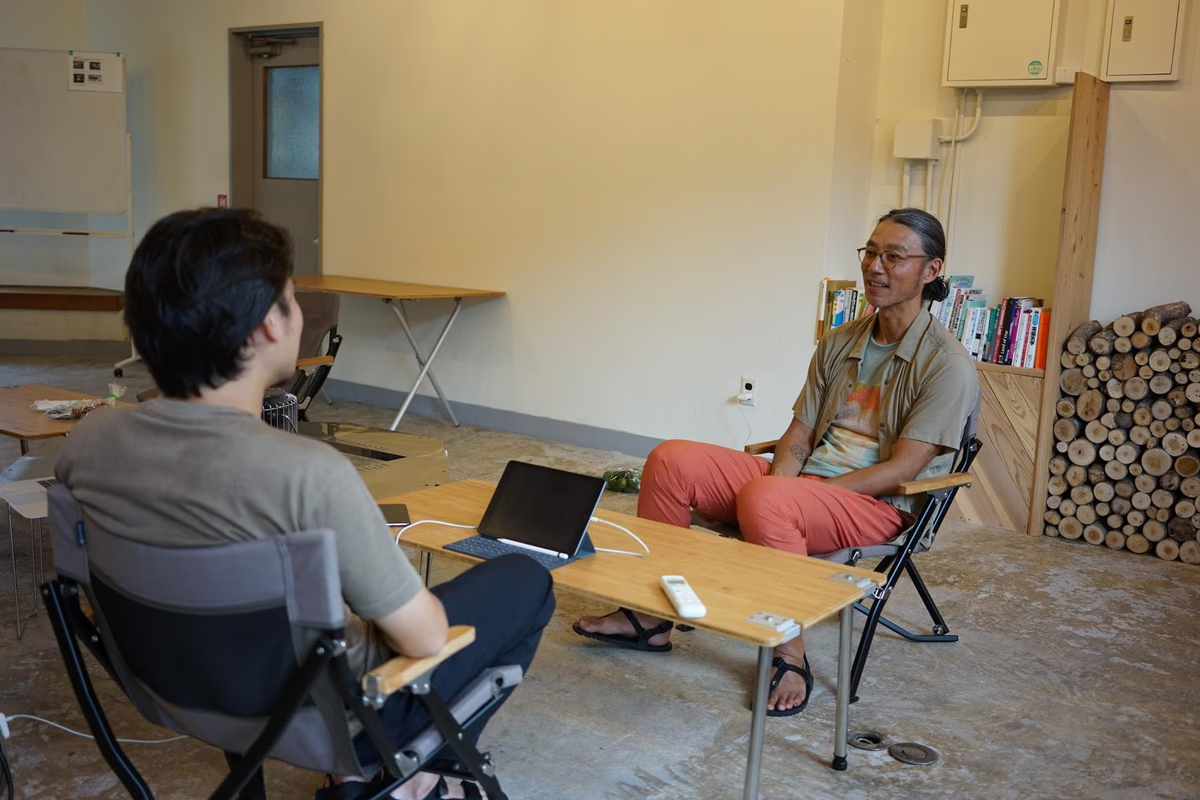
原澤:このコーナー(WORK101インタビュー)は、僕が気になる働き方・生き方をされている人にいろいろ話を聴きに行きたい、というので始まっているんですが、僕ら世代の人たちはみんな多分、迷っているんですよね。働き方も含めて、未来に向けてどっちの方向が良いんだろう?っていうことに。自分の興味関心の近い人から話を聞きたい、何か受け取りたいっていうときに、豊嶋さんがいる方向はなんかいい気がするんです。
豊嶋:仕事とか働き方とか、ライフスタイルみたいなもので悩んでいる人が多いってことかな?
原澤:多いと思います。それに、悩み自体がシンプルなものではなくなっている気がします。コロナのこともありますけども、ポーンと海に放り出されたような感じで。
豊嶋:今年はちょっと特殊事情だね。
原澤:デジタルテクノロジーが進む社会で、決められたことだけをやっていれば良い仕事はどんどん減っていくわけで。仕事の仕方が変わると生活の仕方にも変化が出てくる。悩みがより複雑で、正解がわからなくなった感じがします。
豊嶋:要するに、悩んじゃうくらいに選択肢が増えてきたっていうことかな。僕らのときは、もしかすると今の30代ほど生き方とか働き方にそれほど選べる余地がなかったかもしれない。就職時期がバブル崩壊後すぐというタイミングだったけど、一般的には企業に就職するのが普通だったし、そうじゃない生き方をする人は限られていた気がする。独立しますとか、起業しますとか、自分の才能だけでがんばりますみたいな人は、今と比較するとそんなに多くなかったように思う。だから、そういう生き方をあんまり自分の選択肢の枠に入れなかったのかもしれないね。
最近は自由に選択できるような社会づくりがされてきているよね。それはいいことなんだろうけど、同時に、選べるものが沢山あるけれど、どうやって選んだらいいかわからない、みたいな感じなのかな。
原澤:そうだと思います。もっと自分らしく、豊かに暮らしていくには、選択肢を増やすことが必要だっていうのはずっと感じています。ただ、選択肢が増えれば自由にはなるんだけども、その反面自分で責任をとっていかなければいけないっていうのがありますよね。まだそこに迷いがあるっていうか。これまでは会社に行けば仕事がある状態で、シンプルに考えればよかったんだけど、そうでもなくなってきた。自分で仕事を生み出すことが、必要とされている感じがあります。
豊嶋:選択肢が多いって、けっこう大変だね。
原澤:僕自身も、どちらかというと決められた仕事をより効率よくこなすような、そういう仕事のほうが向いている気がしていたんですよ。ただ、そっちでずっとやろうとするときつくなってくるというか、限界がきちゃったんですよね。決まっている仕事が悪いわけではないんですけど。選択肢がちょっと増えたり、自由度が高くなったときに困ってしまう。もうわかんなくなっちゃう。思考が停止しちゃう。そういう意味で悩みは増えているんじゃないかなと。
豊嶋:なるほど、そういう自由な選択をして生きている人の範囲に僕がいるって見えるんだね。
仕事と遊びの違い。豊嶋さんの暮らし方
杉本:ちなみに豊嶋さんは、原澤さんと同世代の方たちからはどんなことを聞かれるんですか?
豊嶋:「好きなことばかりやっていて、いったいいつ働いているんですか?」とか、「お金を稼ぐことはどうしてるんですか?」ってこと。僕自身、そういう暮らしをしていくために、自分なりに方法を模索しているところがあるから、そういう話をしますね。みんなが言う「働く」っていうのはどういうこと?というところから。たぶん、食べていくためにお金を稼ぐことって答える人が多いよね。そのためにやることが仕事っていうのが今までの捉え方だったけど、最近ちょっとそれが変わってきて、「お金だけじゃないよね」という価値観を持つ人も多くなっている。
仕事や会社のあり方は多様化していると思う。でも、基本的にはやっぱり「これは仕事だしなあ」って思って仕方なしにやっていることや、「それって遊びでしょ?」みたいに少し低く見たりする感じがあるよね。
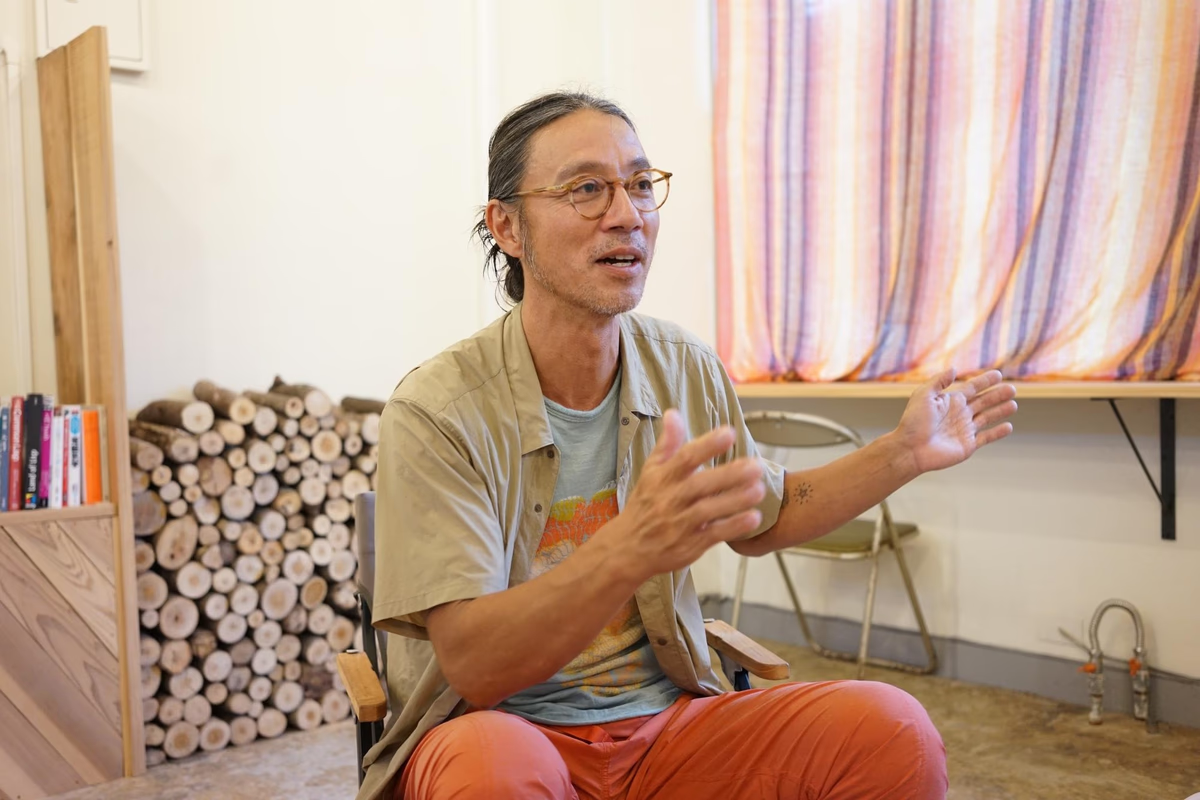
原澤:ありますね。
豊嶋:仕事と遊びの違いは、「お金をもらって責任が伴うこと」ことと「お金をもらわないから責任が発生しないこと」にあると捉えられていると思う。
僕は、1日のなかにお金がもらえるようなやることもあれば、お金をもらえないけどやることがあったり、逆に払わないといけないようなやることもあったりすると捉えている。それによって責任があったりなかったり、一所懸命やったりやらなかったり、そういうところの尺度で仕事と遊びを区別できないと思ってて。
原澤:なるほど。
豊嶋:僕、冬は1~4月までは北海道に住んでずっとスキーばっか毎日やってるんですけど。
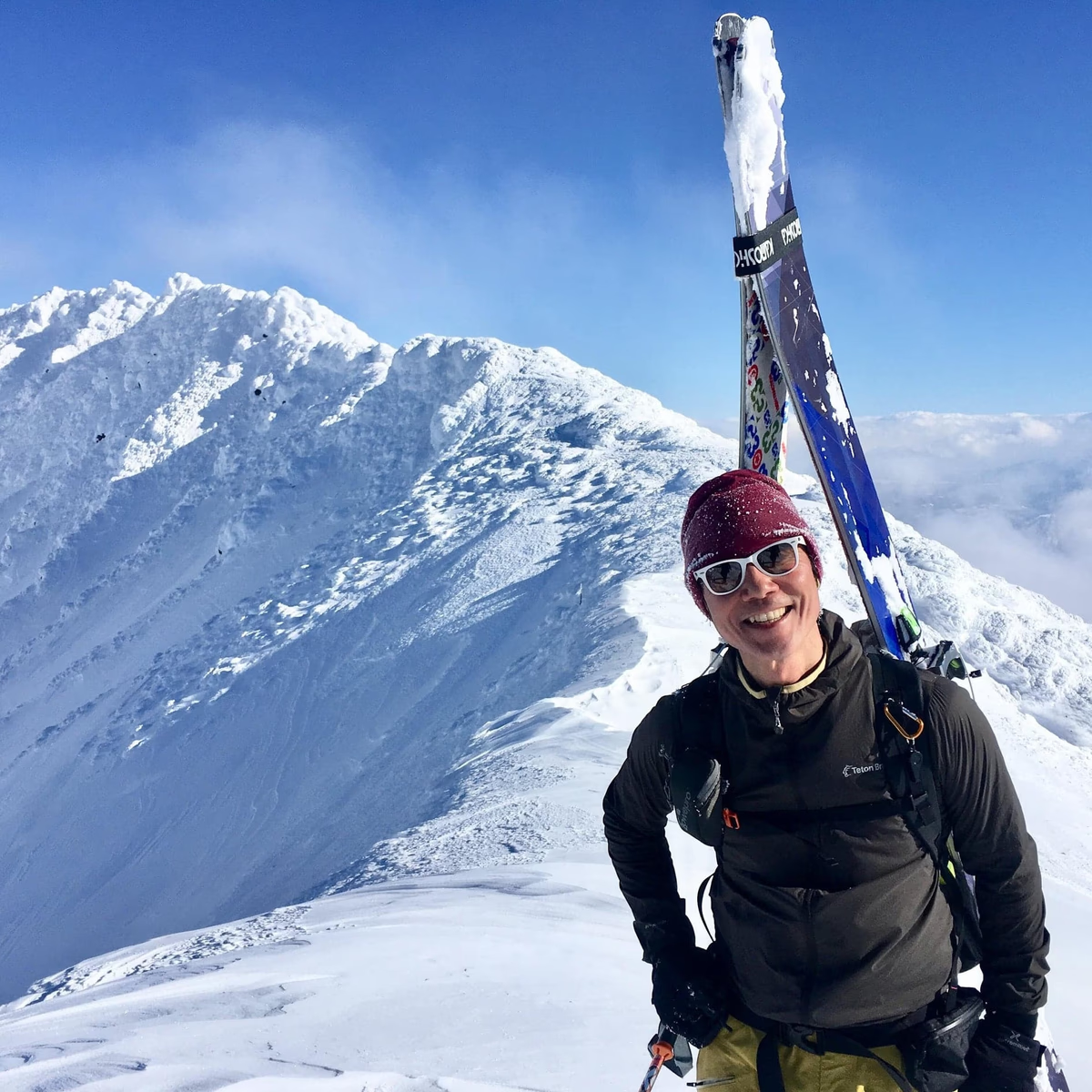
豊嶋さんのホームマウンテンである羊蹄山にて。厳冬期に山頂まで登れる日は多くないという。
それを遊びって呼ぶにはちょっと入れ込みすぎていると思うんです。毎日行くんです、山に。しかもそれは、スキー場じゃなくて、山を登って滑るバックカントリースキーと言われるもので、雪崩のリスクもあるし遭難のリスクもある。でも、僕はガイドやプロスキーヤーではないからそれによってお金を得ることもない。だからと言って、それを遊びというにはちょっとボリュームでかすぎない?と思うし。
杉本:1年の4分の1ですもんね。
豊嶋:あと、家事が好きだということも重要な要素。
炊事や掃除もだけど、最近は洗濯にハマっていて、スキーやサーフィンと同じように、天気予報とか天気図を見ながら洗濯物の量を決めたり、一本の物干しの中でも日当たりの多いところと少ないところがあるから、厚みや素材で干す位置を調節したり、干してる向きを裏返したりして、どれだけ短時間でパキッと乾かせるかとかけっこう楽しくて。それは、いい雪の斜面やいい波のポイントを求めるのと全く同じようなことだと思う。
たくさん仕事をしていっぱいお金をもらって高い家賃の部屋に住んだり、高くておいしいレストランに行くより、直接家事を頑張ったほうがいい暮らしに直結すると思うんだよね。それを考えたら家事は仕事よりむしろ大切で人に任せられないことじゃないかって思う。僕が仕事や生活をする上で人と何か違うとすれば、そのへんの優先順位の付け方が、違いかもしれないなと自分では思っているけど。
ベジタリアンになって感じた、楽しみ
杉本:家事の優先順位があがると暮らしが豊かに変わるよねっていうのは、私もフリーランスで仕事をするようになって感じるようになりました。豊嶋さんは、何か変化があってその優先順位の付け方になったんですか?
豊嶋:僕は二十歳の頃から一人暮らしだったから家事も普通にやってた。でも意識してやっていたわけではなくて、学生だったし、お金もないし必要に迫られてやるっていう程度。ルームメイトに言われたひと言で記憶に残っていることがあるんだけど、僕が毎日毎日掃き掃除しながら、「なんで毎日こんなに埃が出るんだろう」ってぼやくと、彼が「それが人生!」って。瞑想やら禅やらにハマっていた、ひと回り年上のイスラエル人だったんだけど、彼のこの言葉が今になって響いてきてる。炊事や洗濯、掃除って人生に直接的に関わるってことなんだって。
生活って、働いてお金をもらって、そのお金を払って生活に必要なものやサービスを買っていくよね。それよりも、自分が料理をうまくなったほうが、安くて美味しくて本当に今必要なものを食べる近道だなと思ったのね。
僕、この10年くらいベジタリアン(以下、ベジ)なんですけど、ベジになってからは特にそれを感じますね。外食に行っても、専門店に行かない限りまず自分が食べられるメニューのお店なんかほぼないし。
「~の肉抜きでお願いします」って頼ませてもらったとしても、それは本来お店の人の出したいものとは別のものになっちゃうし、どっちにとっても不本意なことになるから、外食するより自分で作る方が楽なんだよね。だから外食もあまり行かなくなってきた。
もちろんベジじゃなくても、料理ってクリエイティブで面白い。料理を覚えると、お金をかけずにたくさんおいしいものが食べられる。僕の場合は食事法を切り替えて、自分がどんどん健康になっていっているのを感じられたので、ベジがうまくフィットしているみたい。ベジがいいと思っているわけではなくて、それぞれに合う食べ物や食べ方があるからそれを見つけられるといいよね。おかげですっかり健康になった。前は、仕事ばっかりしていて不摂生の塊みたいな時代もあったけど。(笑)
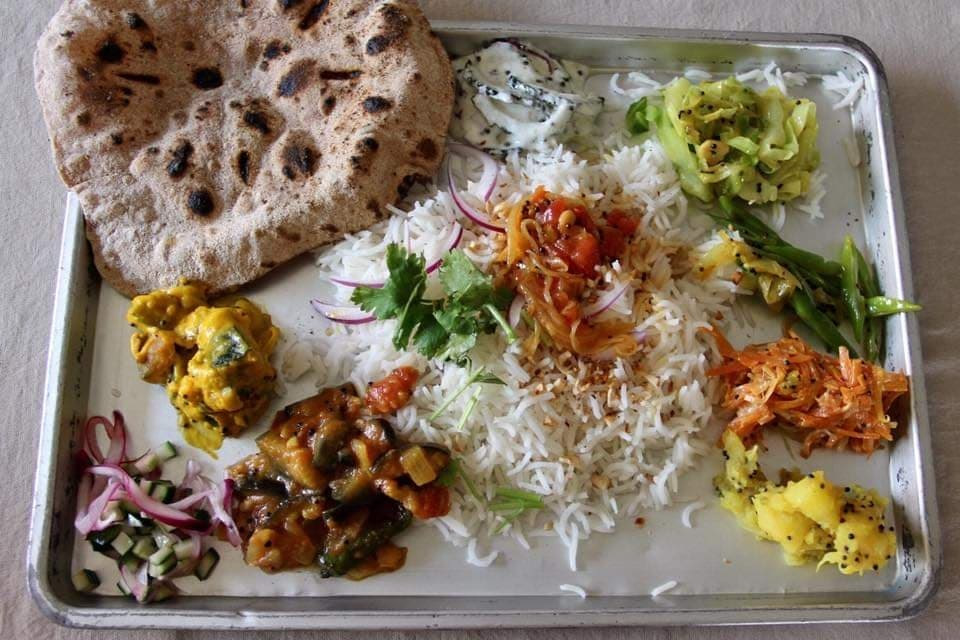
豊嶋さんの作った南インドのベジタリアン料理。インドへクライミングに行ったついでに料理教室にも通ったそうだ。
杉本:そんな時期もあったんですね。
豊嶋:ビッグバンが15年ぐらい前にあった。(笑)それまでは、デザインとかアートの仕事に従事する人にありがちな、「夜中まで仕事をして朝まで飲んでます」みたいな感じやったし、「運動なんて一切しません」みたいな。お腹もぽちゃんとなってて。(笑)ビッグバンが起こってからドミノだおしのようにスイッチがどんどん入って変わっていった。スイッチはひとつじゃなくて、全部が連鎖していって「最近楽しい!」みたいな。(笑)
杉本:「楽しい」って言えるまでに起きたことはひとつじゃなかった。ビッグバン直後はたぶん楽しくなかったのかもしれないですけど……。
豊嶋:うーんと。僕は大学はアメリカの美大に行ってサンフランシスコにいたんですよね。90年、91年頃だったので、シリコンバレーのバブルが起きる前だったから、教授も60年代の元ヒッピーだったり。当時のサンフランシスコには、60~70年代と地続きな雰囲気がまだあって、ベジタリアンの人もいっぱいいて、自然食品のお店や全部量り売りで売っているようなスーパーがたくさんあった。
よく考えると、ベジタリアンとか、バックパッキングとか、サーフィン、フリー・クライミング、バックカントリースキーなんていいう、今の僕が夢中になっているものって全部、学生時代を過ごしたカリフォルニアにあったものなんです。そのときは別にそっちに行かずに、アートに没頭していたけど、20年以上の時を経てようやくひとつずつスイッチが入っていってるのかな。
杉本:そのときはベジをやってみようとは思わなかったんですね。
豊嶋:全然。むしろ反発してた。「ベジタリアン?絶対いやや!肉食いたい!」とか思ってた。
すべてが連鎖していく、スイッチが入った
原澤:豊嶋さんが楽しいって言っているのって、すべてが連鎖していった結果そうなっていますよね。洗濯物が楽しいって話も、サーフィンをやり始めてから朝早く起きるようになり、その日の天気や日照時間を調べるために天気予報をいろんなアプリで調べたり。ひとつひとつをちゃんと楽しもうとしているのかなと思います。豊嶋さんは僕よりも色々経験されてきているし大先輩なんですけど、「最近やっとわかってきた」と聞いて、自分はまだまだ先は長いなあと感じます。
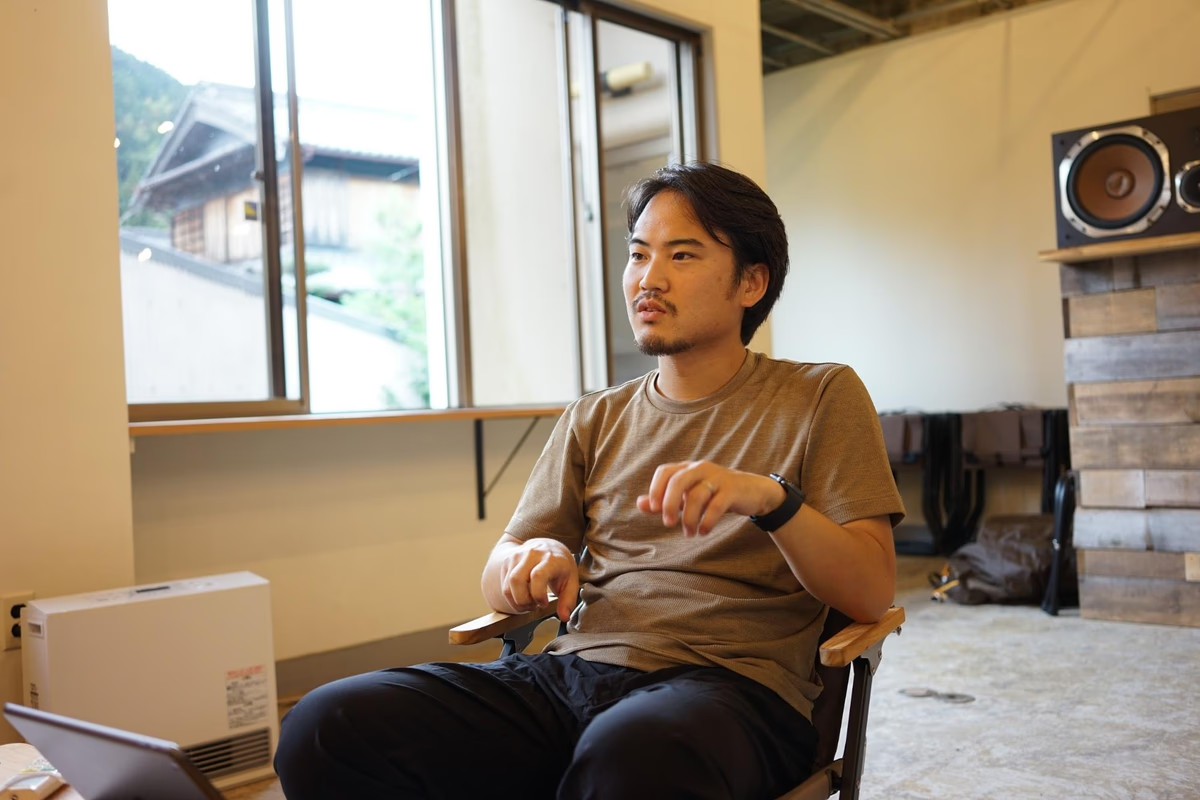
豊嶋:だいぶかかるなぁ、って?(笑)
杉本:原澤さんは何歳ですか?
原澤:31歳です。
杉本:じゃあ、豊嶋さんが31歳のときに、今の自分のような人に出会って、スイッチが一個ずつ入っていくっていう話を聞いたら、自分のスイッチが入ったと思いますか?
豊嶋:どうかなぁー。先輩の言葉に助けられたみたいなことはあったけど。でも、その時の自分がやってることに夢中だったかもしれないね。31歳のときってロンドンに住んでた。チェルシーカレッジの大学院に行ってたんですよ。その時はもうgrafの活動がはじまっていて、「やるなら絶対にインターナショナルな結びつきを持つものにしたい」って気持ちがすごくあって。「ちょっとごめん。俺、ここで大阪離れて海外に布石を打ちたい」って言って、ロンドンに行ったんです。
ロンドンには、大学院が終わってからも現地の仕事をやりつつ、日本と行ったり来たりしながら足かけ3~4年くらいいました。
31歳ってそういう感じやったんよ。結構ガツガツやってた、あんまり迷いなく。
原澤:「インターナショナルに」って思ってパッて行動するというところはかなり尊敬するし、自分と違うところだと思います。僕の場合だと「自分には合わない、出来ない」と思ったら、環境を変えるのではなく、その環境に自分を合わせる感じで行動してしまいます。
杉本:合わないと思っていても合わせようとしてるんですか?
原澤:えーっと、今はちょっとわかんなくなっている感じですね。少し前まではそういうタイプだったと思うんですけど、WORK101のような自分のプロジェクトをやらせてもらったり、豊嶋さんと知り合って一緒に仕事をしたりして少しずつ考え方は変わってきている気がします。
杉本:原澤さんも、変わりかけているみたいですね。
豊嶋:うん。スイッチ入りかけてる。
後編へ続く
